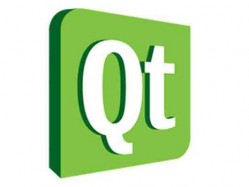 During the first day of its European DevCon event being held in Amsterdam, RIM has confirmed that alongside support for Android apps, the forthcoming PlayBook 2.0 update will also support the formerly Nokia-backed Ot application framework for application development on the PlayBook with future support being expanded to BlackBerry 10 devices slated for launch at the end of the year.
During the first day of its European DevCon event being held in Amsterdam, RIM has confirmed that alongside support for Android apps, the forthcoming PlayBook 2.0 update will also support the formerly Nokia-backed Ot application framework for application development on the PlayBook with future support being expanded to BlackBerry 10 devices slated for launch at the end of the year.
With the addition of Qt framework support, RIM is going after developers that formerly developed for Nokia devices and profiles, though Qt framework-based apps were few and far between on Symbian^3 and higher devices, while the MeeGo Harmattan-based N9 used Qt as the main application framework with mixed results as the phone was deliberately limited to select markets where Android and iOS did not have a major presence, such as Latin America and Eastern Europe.
RIM also reiterated that the long-awaited PlayBook update is still on track for release this month even with the newly announced framework support and the forthcoming relaunch of the device with 4G LTE support slated for later this year.
RIM has historically struggled with the PlayBook tablet since the launch of the device last April, with drastically lower than expected sales and less than stellar reviews leading to cancelled variants and most recently, a wave of firesales after RIM wrote down more than $400 million in unsold inventory during their last earnings call.
The unsold inventory became the catalyst for the shock resignation of former co-CEOs Lazaridis and Basillie late last month for new CEO Thorsten Heins, currently present at DevCon Europe and laying down the gauntlet against Android by claiming such figures as 13% of developers making $100K+ in revenue via BlackBerry App World, as well as talking up substantial growth in Europe and Southeast Asia while lamenting the decreasing marketshare of the platform in its core US and Canadian markets.
The Qt framework and SDK for the BlackBerry PlayBook are available to developers now and RIM did confirm that its adoption of the framework would mean that it would contribute all of its changes back to the main branch, save for user interface additions which will remain proprietary, as they will form the basis for the new BlackBerry 10 user interface and is code named Cascades.
Since Qt support also underpins the native application development support present in PlayBook 2.0, former Qt developers will have little trouble porting existing applications to the PlayBook and BlackBerry 10 devices in the future owing to its basis in C/C++ in comparison to current SDKs which require knowledge of Adobe AIR/Flex and are considered less flexible and powerful.